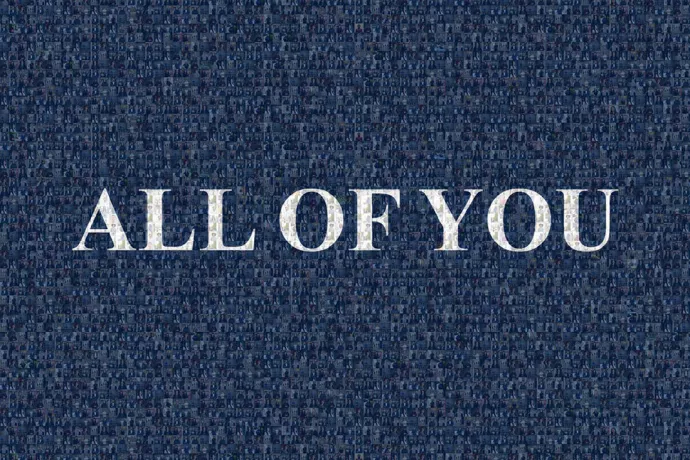
Meet the U of T students who crushed it in 2020
At the end of each year, U of T News looks back on students’ achievements over the past 12 months and recalls some of the more impressive or inspiring feats.
Previous lists of “students who crushed it” include those who organized the first powwow at the university in decades, or who made Black graduation a fixture of spring convocation.
But 2020 has been a year unlike any other. The COVID-19 pandemic forced everyone at the university to rethink the way they do things, and U of T News is no exception. There was quite simply no way to boil this year’s list down to just a handful of exceptional student stories – an exercise that was next to impossible at the best of times, given the sheer number of impressive student accomplishments.
In the space of just a few weeks last spring, the university’s 93,000 students pivoted to online classes, labs and tutorials in a collective effort to curb the spread of COVID-19. And, as if that weren’t enough, many also found time to help their communities by sewing face masks, running errands for front-line workers, taking care of children, checking in on the vulnerable and, most importantly, supporting each other.
So, at the risk of sounding corny (and with apologies to Time magazine’s choice for Person of the Year in 2006), the list of students who crushed it this year begins with ...
You!
Earning a university degree became orders of magnitude more challenging when the pandemic hit. Suddenly, it was no longer possible to attend classes in person, hang out with friends on campus or even do something as simple as study in a coffee shop.
Yet, despite the many, many challenges, U of T students made the best of the situation by adapting to virtual classes while figuring out how to re-order their living arrangements – and lives – on the fly.
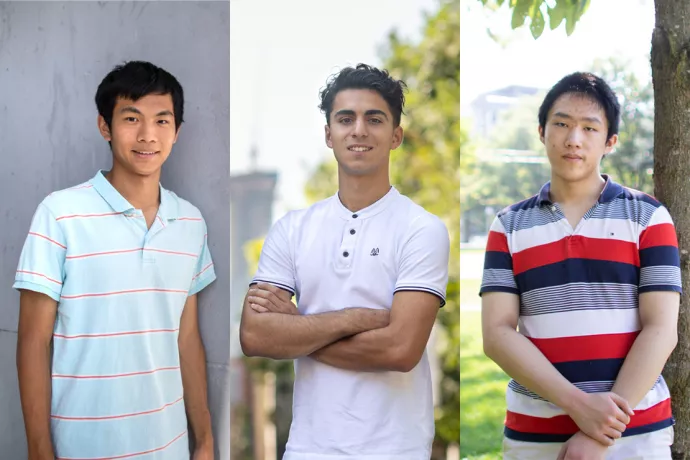
Many first-years – including Michael Acquaviva, Michael Li and Qingyuan Wu, who were among the Toronto District School Board’s top students – rose to the challenge of starting their U of T careers amid the uncertainty of a global pandemic.
“My generation will be viewed as the one that lived through a pandemic and that had to adapt to certain changes in the world,” Acquaviva told U of T News in August as he prepared to embark on a degree in engineering science at U of T’s Faculty of Applied Science & Engineering.
“I think that ultimately is a strength when it comes to adaptability. It builds resilience.”
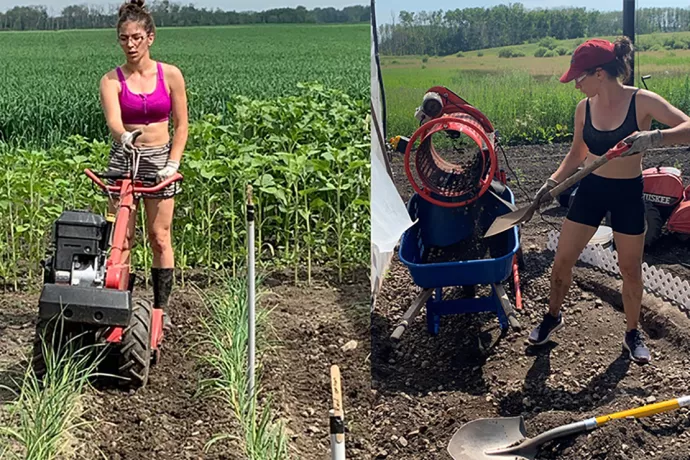
Meanwhile, student athletes like Brenna Hamel, a Varsity Blues triple jumper and Rotman Commerce public accounting specialist, went from working at a tech consulting firm in Singapore to living on the family farm north of Saskatoon, where she got creative with her training regimen by using a PVC tube and two dangling backpacks as a makeshift weight machine.
Katie Gay and other members of the Varsity Blues rowing team stayed active – and competitive – by designing a “quaranteam” challenge in which teams of students and alumni competed for most metres by running, erging, cycling or dancing at a safe distance from one another.
In another example of students’ ingenuity in the face of COVID-19 protocols, the U of T Mississauga residence choir found a way to continue making music during the pandemic by recording their parts individually and mixing them together. In lieu of public performances, the HomeNotes choir shared their songs with “virtual coffeehouses.”
COVID-19 posed a particular challenge for international students. They watched lectures at all hours and from all around the world. Many also travelled to Toronto once COVID-19 restrictions allowed and spent 14 days in quarantine at U of T-booked hotels. Friends Piya Sial and Shashwat Aggarwal both returned to campus from the Delhi area earlier this year and kept in touch throughout their quarantines in an effort to lift each other’s morale.
Others worked with staff to develop new studying schedules and routines while still others pitched in to create virtual orientations that welcomed new students to campus – even if they weren’t actually going to be here. U of T Engineering students, for example, delivered hundreds of orientation packages, including a hardhat and purple face paint, to first-year students as far away as Italy, Brazil and Japan.
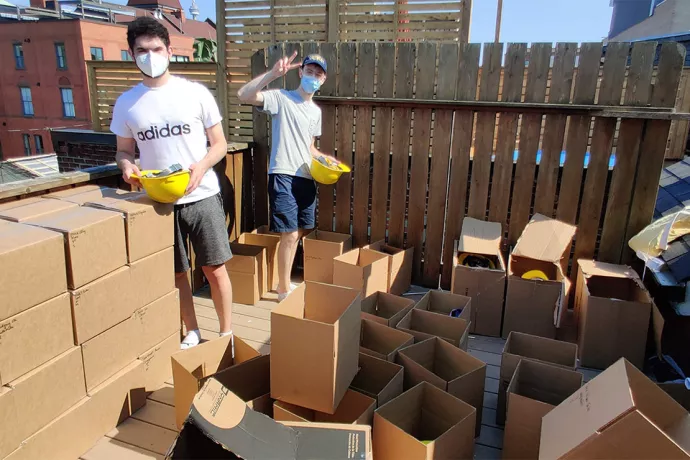
Zoom lectures gave students and teachers a glimpse into each other’s private lives, and often this led to moving interactions. Samantha Chan, a life sciences student, posted a video on TikTok of her reaction to Assistant Professor Adam Hammond, in the department of English, wishing his cat, Wendy, a happy 10th birthday. The clip made both student and teacher unwitting social media sensations, racking up over 734,000 views.
Still other students supported each other by forming online study groups. For example, Andy Ye, a biology major, became a study group leader, boosting his grades and learning leadership skills in the process – just one of thousands of U of T students who persevered with their studies and, when possible, found ways to help those in need.
The Class of 2020
It goes without saying that the Class of 2020 didn’t plan to celebrate their convocation – a culmination of years of hard work, new experiences and lifelong friends – from kitchens and living rooms around the world.
But the virtual spring and fall convocation ceremonies were nevertheless a time for smiles and celebration – precisely because the Class of 2020 managed to complete their degrees in the middle of a global public health crisis.
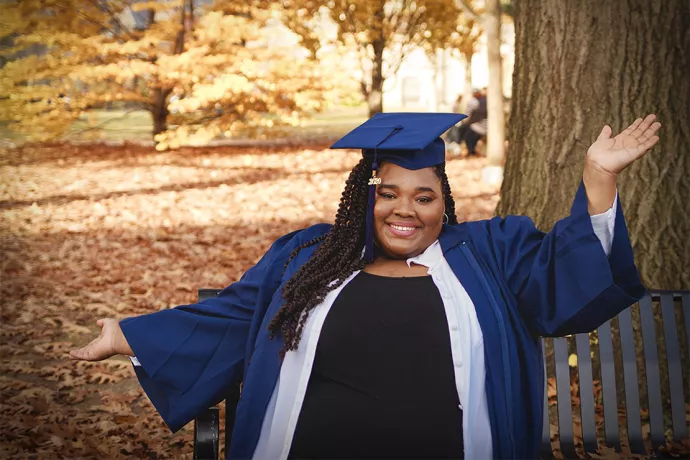
Carisse Samuel, for one, not only surmounted the challenge of completing her degree during a pandemic, she also overcame a sudden and severe brain injury. Four years ago, she was diagnosed with anti-NMDA receptor encephalitis, a rare autoimmune disease that affects the brain and is informally known as “brain on fire.” After five months in a coma, and many more of treatment and rehabilitation, she returned to U of T Mississauga to earn her degree in digital enterprise management.
“My motivation was that I needed to graduate school,” Samuel said. “That was something that lit a fire under me. I wanted to finish and walk across that stage and say, ‘I did it.’
“That was really important to me.”
For Keon Priestley, earning a bachelor’s of arts degree was a way of honouring his late mother, Marie, who had always encouraged him to finish his university education. After a 20-year hiatus that began with a health issue, Priestley returned to U of T Scarborough at age 40 to finally finish what he started.
“I feel like my degree belongs to the both of us,” he said.
Marcus Singleton was also inspired by his mother to pursue higher education. Following in her footsteps, the accomplished hip-hop artist from Chicago’s South Side obtained a master’s degree in social justice education from U of T’s Ontario Institute for Studies in Education.
If the Class of 2020 is any indication, the world has many reasons to be hopeful. Anowa Quarcoo, a former journalist and communications specialist who returned to school for a master’s in global affairs and business administration, spent much of her time at U of T working at the intersection of technology and social issues in an effort to improve people’s well-being. She researched Tanzania’s medical supply chain as part of the Reach Alliance and worked for a non-profit in Nairobi that encourages African voices in local development.
Malek Abdel-Shehid, who graduated in the fall with a degree in human geography and diaspora and transnational studies, with a minor in African studies, helped organize a conference on campus for Black high school students from across the Greater Toronto Area so that they could get a feel for university life. Next up? A certificate in geographic information systems mapping at Ryerson and possibly a master’s in urban planning.
“Another one of my goals is to do social planning and advocacy work with community organizations towards supporting marginalized communities,” he said.
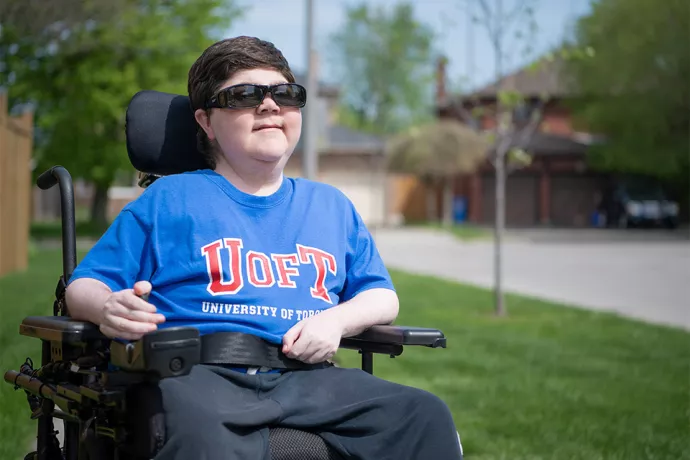
Alex Harold, who was diagnosed with Duchenne muscular dystrophy when he was four, began his degree in 2011 and graduated from the highly competitive management co-op program at U of T Scarborough this spring. A spokesperson for Muscular Dystrophy Canada, he plans to dive back into volunteer and charity work. And Maddie Zhang, U of T’s youngest grad, plans to put her talents to work on sustainability in aerospace engineering.
“Greta Thunberg, she’s around my age basically,” she said of the Swedish environmental activist who is just one year Zhang’s junior. “She did an amazing job being an activist … but I want to work toward the same goal in my own way – in my engineering way.”
In the spring and fall, the Class of 2020 heard from some of their own during the virtual convocation ceremony as student ambassadors congratulated their peers.
Habon Ali, a biology and environmental science student and U of T Mississauga valedictorian, was among them. In the previous two years, she raised such topics as anti-Black racism, gun violence and, more recently, the impact of COVID-19 on youth at the highest echelons of Canadian government, even meeting with Prime Minister Justin Trudeau as a member of his youth council.

Students, their families and friends on almost every continent tuned into the virtual convocation events and found creative ways to mark the occasion. In June, for example, law students Haim Abraham and Eden Sarid dressed up for the virtual ceremony in imitation regalia of their own design, blue and teal bathrobes with tinfoil mortarboards.
And even if they couldn’t celebrate with their loved ones in person, students were able to share the moment with their families.
At convocation, U of T President Meric Gertler commended the Class of 2020 on their courage for pursuing their studies despite extraordinary challenges and invited them back to the university to celebrate their achievement in person when it was safe to do so.
“We look forward to seeing you then and to acknowledging each of our graduating students at those celebrations,” he said.
The students who helped organize memorials for the victims of Flight 752
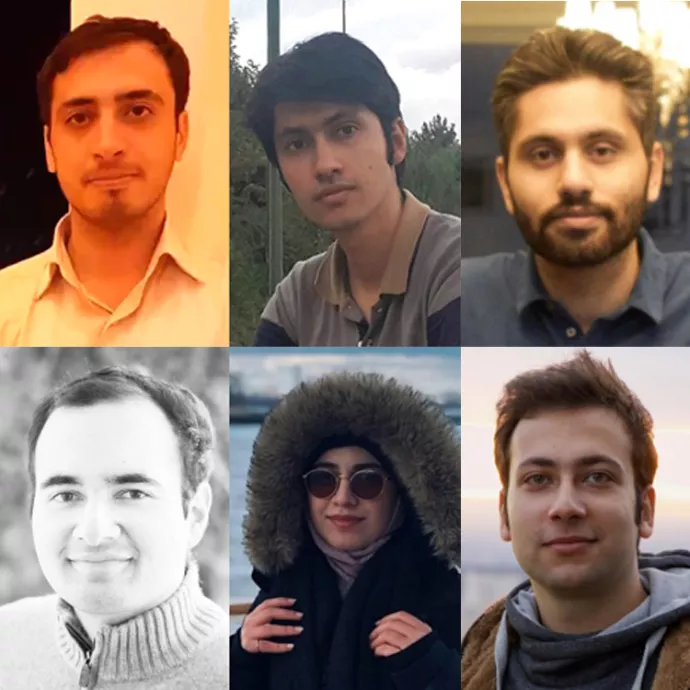
Eight days into the new year, Ukraine International Airlines Flight 752 crashed shortly after take-off in Tehran, killing everyone aboard including eight members of the U of T community – six of whom were students: Mojtaba Abbasnezhad, Mohammad Asadi-Lari, Zeynab Asadi Lari, Mohammad Amin Beiruti, Mohammad Amin Jebelli and Mohammad Salehe.
The vast majority of the 176 people aboard were connected to Canada, and at least 61 were directly affiliated with Canadian universities as students or faculty, according to University Affairs.
In the wake of this heart-rending event, the U of T community came together to honour the victims of the crash and to support one another. Caspian Forouhar, the vice-president of the U of T Scarborough Iranian Students’ Organization, quoted the 13th-century Persian poet Rumi at a memorial on campus: “Goodbyes are only for those who love with their eyes. Because for those who love with their heart and soul, there is no such thing as separation.”
Across the campus, students, staff, faculty and people outside the U of T community said prayers, held candlelight vigils, and shared memories about those who died, with each name representing an incalculable loss of potential.
U of T also established the Iranian Student Scholarship Fund in the memory of the victims of Flight 752. The needs-based award supports students who are from Iran or who are taking Iranian studies.
The students who contributed to pandemic relief efforts
Even before the World Health Organization declared COVID-19 a pandemic, U of T students were looking to do whatever was in their power to help.

A group of U of T medical students – Jordynn Klein, Daniel Lee, Tingting Yan and Orly Bogler – were quick to anticipate the strain that a wave of coronavirus infections would put on the health-care system, so they put a call-out on Twitter to recruit volunteers to help tired front-line workers with everyday activities like groceries and childcare. Within days, their ranks had grown to more than 240 volunteers – all carefully screened for symptoms before being dispatched to help across the Greater Toronto Area.
“If there’s one thing that we had reinforced over the course of this initiative, it’s that bravery … is doing what you think is right, especially when you’re scared,” said Klein.
With news of medical supplies running low, many students took it upon themselves to sew face masks and recruited volunteers to do the same. Kramay Patel and Chaim Katz, PhD candidates in the Faculty of Applied Science & Engineering, organized Stitch4Corona, a campaign to sew fabric masks for Toronto’s most vulnerable.
Another group of students sourced masks, gloves, hand sanitizer and other in-demand medical supplies across the city for donation to hospitals, clinics and seniors’ residences. They called dentists, salons, veterinary clinics and even tattoo parlours to solicit donations and collected more than 83,600 pairs of gloves in unopened boxes, 2,700 surgical masks and hundreds of N95 respirators.
Meanwhile, medical students Monisha Persaud, Geoffrey Sem and Daniel Lee enlisted volunteers to conduct weekly phone check-ins with seniors to share important health information and cut down on their social isolation.
“We hope to show our seniors across the country that we care and are here for them,” Lee said.
With the lockdown often placing its biggest burden on the elderly, many other U of T students were also keen to help seniors. Master of public policy student Adam Zivo created an initiative called LifeCrates to deliver food to low-income elders. With the help of registered dieticians who vetted packages for nutritional value, LifeCrates delivered a month’s worth of groceries to hundreds of low-income seniors.
U of T students’ efforts continue to this day. Bipasha Goyal, a third-year engineering student, and her colleagues on Team LumineSence are working on a smart UV lamp in a bid to develop an effective and inexpensive way to sterilize surfaces in hospitals, schools and residential buildings.
The students who stood up for a more just society
Chika Stacy Oriuwa wanted to be a doctor since she was a little girl.
But when she entered medical school at U of T as the only Black student in her class of 259, she discovered a second calling as an advocate for equity, inclusion and diversity.
Earlier this year, Oriuwa graduated as class valedictorian. Along the way to convocation, she helped usher in change at U of T as an ambassador for the Black Students Application Program, an initiative established in 2017 to address the underrepresentation of Black students in medicine.
The numbers of Black medical students have consistently risen since Oriuwa arrived. This year, 24 Black students were admitted to U of T’s medical school, the most in Canadian history.
In her valedictory speech, republished in Maclean’s magazine, Oriuwa closed with a poem for her medical school class:
We had a vision of 2020,
though the picture didn’t quite come out as clear as we thought it would be
We remained a class of visionaries.
Those with the foresight to define themselves in the world
Who raise their arms with fists curled in the face of injustice
As our patients entrust us with their lives,
The time has officially arrived for us to rise to the occasion
Entisar Yusuf, who recently graduated with a master’s in education from the Ontario Institute for Studies in Education, also said she felt isolated upon arriving at U of T – a feeling that continued even after she met up with members of the U of T Black Students Association.
So, she launched the Black Graduate Student Association, with the goal of catering to students who were a little older.
“I saw there was a need," she said.
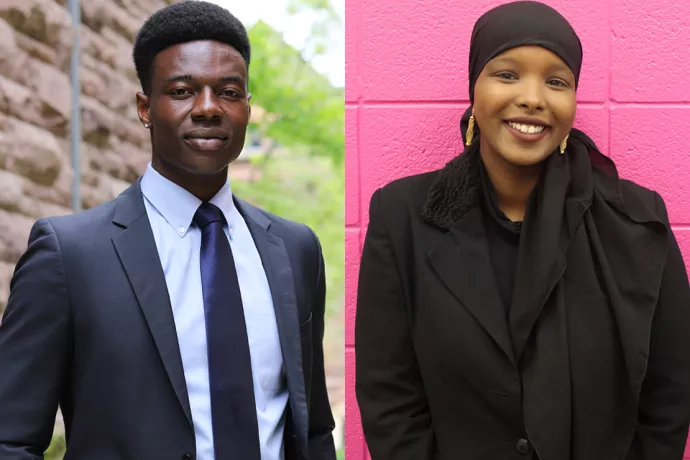
Ikran Jama and Jeffrey Fasegha, U of T’s newest Rhodes Scholars, are also pushing for the changes they want to see in the world.
Jama, pursuing a double major in criminology and socio-legal studies and international relations with a minor in African studies, mentored Somali youth and, as a fellow at the Mosaic Institute thinktank, sought to reduce social divisions and prevent conflict. A Somali-Canadian born to refugee parents, she’s interested in researching how the law affects the lives of immigrant and refugee youth and advocating legal reform.
“I’ve had to overcome a lot of barriers to even get to this stage in my studies and this award is a sign to me and anyone in the same position that we can always achieve incredible things,” she said.
Fasegha, who graduated from the Faculty of Arts & Science in June with a bachelor’s of commerce in finance from Rotman Commerce with minors in psychology and economics, aims to use innovation and entrepreneurship as tools for economic and social development, particularly in Nigeria, where he was born. At U of T, he pursued independent research on social enterprises in the Nigerian energy sector, founded the Black Career Conference, co-founded Black Rotman Commerce and held several leadership positions in finance student organizations, in which he promoted equity for marginalized groups.
“As I begin this new chapter in my life, I remember fondly the many kind people I’ve met at U of T and the good times we’ve had – with a special shout out to the Black Rotman Commerce community and the professors who changed my life,” he said.
In the Faculty of Applied Science & Engineering, students like Luisa Gragirena-Husbands helped launch an outreach program connecting Black high school students with a love of STEM with graduate student mentors.
Another recent graduate, Melissa Sariffodeen, helped empower people by teaching them to code through the registered charity she co-founded, Canada Learning Code.
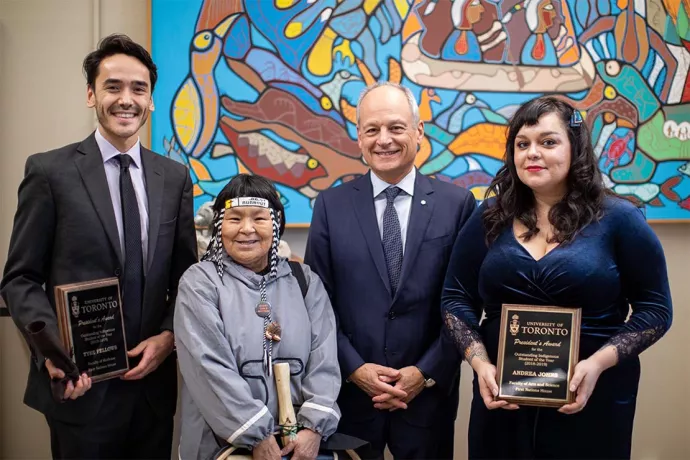
Indigenous students Andrea Johns and Tyee Fellows demonstrated a commitment to giving back to their communities. Johns, who is Kanien'kehá:ha/Mohawk, Turtle Clan with ancestral roots at Six Nations of the Grand River, came to U of T as a mature student and founded the Indigenous Languages Club, which offers drop-in lessons on Mohawk and Anishinaabemowin.
Fellows, for his part, is a fourth-year medical student of Inuvialuk/Caucasian background who is well on his way to becoming one of Canada’s few Inuit doctors. He plans on pursuing emergency medicine and continuing to advocate for equity.
Both Fellows and Johns were awarded the President’s Award for the Outstanding Indigenous Student of the Year.
Many students focused their efforts on sustainability and climate change. Andy Alhakim and Ana Karen Garza are two of the seven undergrads who, as Adams Sustainability Champion Interns, contributed to Committee on the Environment, Climate Change and Sustainability (CECCS) projects at U of T while researching other global universities’ sustainability efforts. And the U of T Artificial Intelligence student group (AI at U of T) launched a global undergraduate research competition challenging teams to apply machine learning solutions to the impacts of climate change.
“I think [climate change] is the most urgent problem that we have right now,” said undergrad Elias Williams, one of the organizers. “I think that pursuing technological solutions is the way that we’re going to get out of the hole that we’re in.”
Some students worked toward a more accessible community for all – including Adrian Petterson, a Master of Information student who is the project lead for U of T's Accessibility Arcade.
“Our society is so focused on digital platforms that it is vital digital spaces are created to foster innovation in general and be accessible to everyone,” Petterson said. “Some of the most powerful innovators are individuals with disabilities.”
With a focus on mental health and remote northern communities, Euan Pound, a first-year math student, worked to extend the reach of mental health services by creating software that conveys a person’s facial expression through an avatar at a lower bandwidth than video.
“We came up with a solution that could fix the problem of low bandwidth in northern communities and provide an alternative for camera-shy clients, while still allowing the caregiver to see expressions and non-verbal cues through the avatar,” he explained.
Back on campus, Oghogho Abigail Iyekekpolor, a second-year student at St. Michael’s College, launched a new social media campaign called #SoulsofSMC that focused on telling inspirational student stories with an eye on exploring and celebrating diversity.
“It’s important for people to take the time to think about how other people – and they themselves – are represented,” she said.
